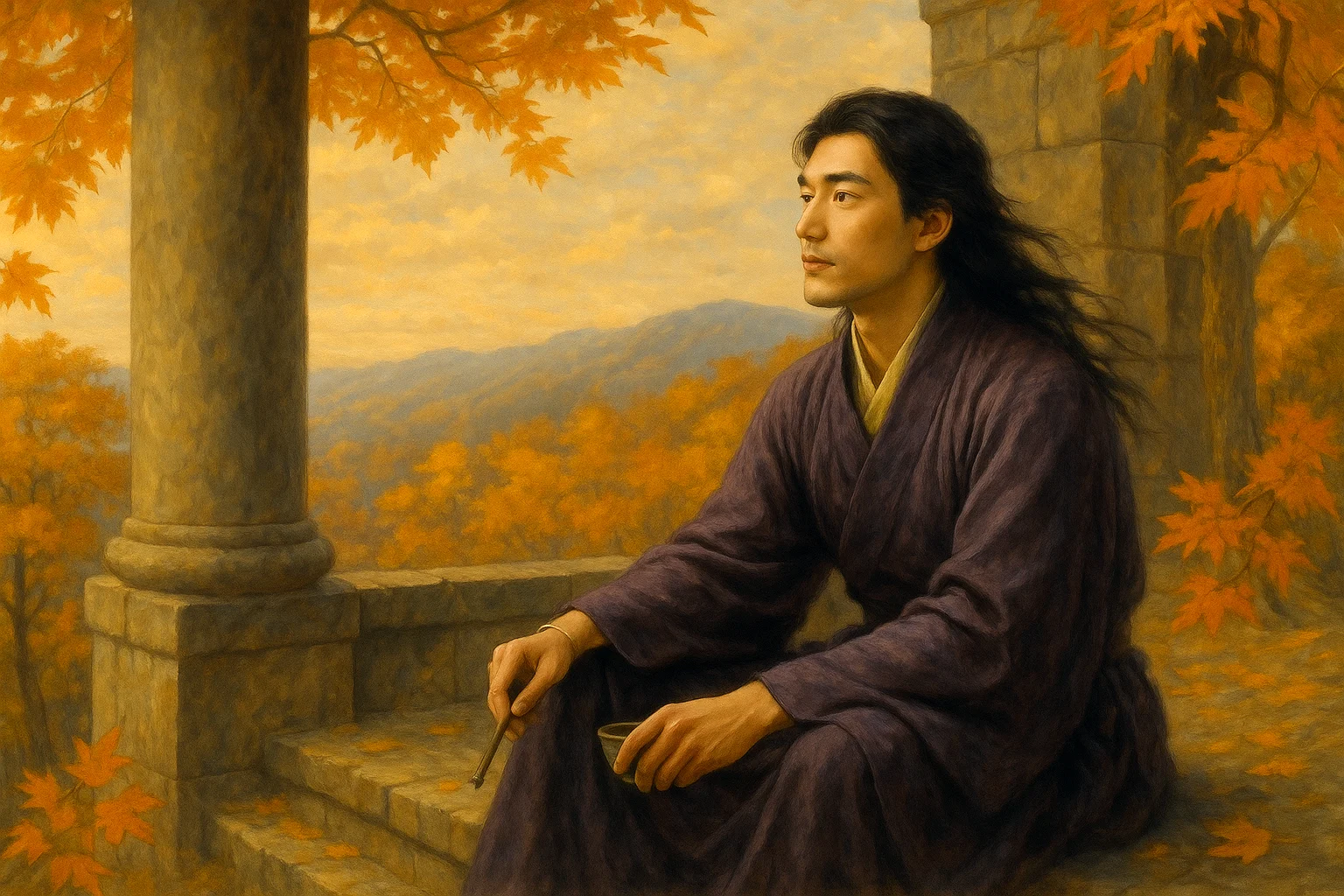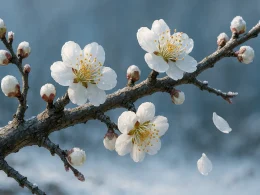Deep autumn, midnight's hour passed by,
A wanderer sees wild geese cry.
Lonely, the heavy gate stays shut,
No one asks what weighs my heart but.
Original Poem
「秋夜」
耿玮
高秋夜分后,远客雁来时。
寂寞重门掩,无人问所思。
Interpretation
This poem was likely composed by Geng Wei during his travels, in one of those sleepless nights far from home. Throughout his life, Geng Wei knew well the pangs of displacement, often dwelling in borderlands or desolate towns. Autumn nights have always been particularly evocative of melancholy thoughts, and "deep in the autumn midnight" represents the most profound and silent hour of darkness. In this setting, the poet sits alone in his solitary chamber, his thoughts in turmoil yet with no one to confide in, thus composing this poem to convey his secluded feelings. The entire piece carries a chill, melancholic tone, thoroughly expressing the loneliness and sorrow of a traveler in the depth of night.
First Couplet: "高秋夜分后,远客雁来时。"
Gāo qiū yè fēn hòu, yuǎn kè yàn lái shí.
Deep in the autumn midnight,
A traveler sits as wild geese take flight.
"Deep autumn midnight" establishes the season and time, with its rich autumnal atmosphere and profound darkness evoking a sense of cold solitude. "Traveler" speaks to the poet's identity as a wanderer in a foreign land, embodying the alienation of his circumstances. "Wild geese take flight" is not merely descriptive but also carries traditional connotations—geese as messengers, symbols of homesickness and the longing for news from home. This line blends scene and emotion, rich in implication, depicting both the physical landscape and the thoughts of a lonely journey.
Second Couplet: "寂寞重门掩,无人问所思。"
Jì mò chóng mén yǎn, wú rén wèn suǒ sī.
Lonely behind bolted gates,
No one asks of the heart that waits.
This couplet turns inward to the poet's emotional world. "Bolted gates" symbolize not only the physical environment but also the isolation of a heart with no outlet for its thoughts. "No one asks" directly states his solitude, transitioning from the external nightscape to the loneliness of the soul. Though seemingly plain, the line is profoundly moving—like a sigh that pierces the night, echoing long after.
Holistic Appreciation
This four-line poem condenses a vivid scene of a solitary traveler sitting alone in the depths of autumn midnight. The poet selects imagery such as "high autumn," "midnight," "arriving geese," "layered gates," and "no one present" to craft an atmosphere of serene vastness with an almost chilling precision. Readers are transported into the mindset of a sojourner, as if experiencing the moment firsthand. The poem contains no clamor or intense emotion, yet its restrained stillness resonates deeply. Stylistically, it aligns with the tradition of Wang Wei and Chu Guangxi—landscape poetry that embodies "contemplation within tranquility, emotion within subtlety"—showcasing Geng Wei's introspective and understated artistic temperament.
Artistic Merits
- Expansive and Ethereal Atmosphere: Through images like "midnight," "arriving geese," and "layered gates," the poem sketches a quiet solitude that seeps from the environment into the bones, immersing the reader in palpable loneliness.
- Fusion of Scene and Sentiment, Implicit Yet Evocative: While depicting tangible scenery, the poem also unfolds emotion—hinting at "unspoken thoughts" without specifying their subject, leaving rich ambiguity for interpretation.
- Elegant Simplicity, Restrained and Suggestive: Geng Wei excels in plain depiction, eschewing ornamentation yet capturing emotional depth, embodying the unique charm of his "sparse, tranquil" poetic style.
Insights
The poem offers a profound reflection on solitude: not as neglect amid noise, but as the swirling of thoughts and emotions in the stillness of night. In today's fast-paced world, where interpersonal connections often remain superficial, this experience of quiet midnight contemplation feels especially precious. Through the gaze of a traveler, Geng Wei renders loneliness with moving serenity, reminding us that true longing and sorrow often dwell not in words, but in the silence of the unknown night.
About the poet

Geng Wei (耿湋, dates unknown), a Tang dynasty poet from Yongji, Shanxi, was among the "Ten Great Talents of the Dali Era." Renowned for his mastery of five-character regulated verse, his poetry is distinguished by its economical diction and tranquil imagery. While the prevailing style of Dali poetry tended toward austerity and desolation, Geng Wei developed a distinctive voice marked by understated naturalism.












